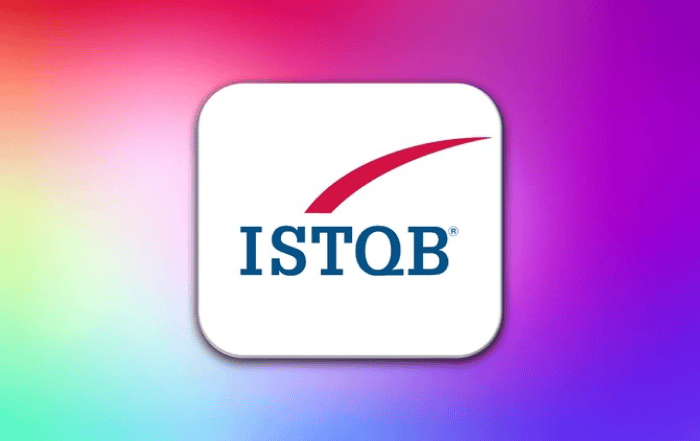
Are you looking to elevate your career in software testing? The ISTQB Advanced Test Analyst Certification might be your golden ticket. This credential not only bolsters your expertise but also enhances your career prospects in the competitive field of software testing. At Codelattice, our comprehensive course is designed to prepare you thoroughly for this prestigious certification.
What is the ISTQB Certification?
The International Software Testing Qualifications Board (ISTQB) accredits software testing specialists worldwide, offering a systematic and thorough approach to learning the concepts and procedures of software testing. A successful career in software testing can be established by solidly understanding what is the ISTQB certification entails.
Why ISTQB Certification is Important?
An ISTQB certification signifies that you possess the skills and knowledge to perform software testing professionally. Employers highly value this certification, which can open doors to advanced career opportunities.
Here are some reasons why ISTQB certification is important:
- Global Recognition: ISTQB certification’s global recognition makes you a highly sought-after candidate for businesses worldwide.
- Enhanced Skills: It gives you a deeper understanding of testing methodologies, techniques, and tools.
- Career Advancement: Certified professionals are often considered for higher-level roles and responsibilities.
- Professional Credibility demonstrates your commitment to the profession and continuous field improvement.
Understanding the ISTQB Advanced Level Test Analyst Certification
Individuals with experience in testing who wish to expand their skill set should pursue the ISTQB Advanced Level Test Analyst Certification. This certification primarily focuses on advanced techniques for test design, analysis, and execution.
Course Overview by Codelattice
With our ISTQB Advanced Test Analyst Certification course, you can learn about the function of the test analyst and get complete, proven methods to conduct thorough software testing at every stage of the software development life cycle. Sign up today to understand every aspect of the test process. Our engaging training session will improve your ability to administer tests confidently and accurately. The training offers practical experience through various testing techniques and aids in understanding the significance of an advanced test analyst’s role in the software testing process.
Major Takeaways
- Practical Industry-Level Experience: Gain hands-on experience and receive valuable feedback every step of the way.
- Enhanced Collaboration Skills: Improve your communication and collaboration skills with team members and other professionals.
- Effective Testing Procedures: Learn to execute proper testing procedures based on the software.
- Choosing the Right Methodologies: Implement suitable testing methodologies considering specified coverage standards.
- Tool Proficiency: Know which tools to use to increase the test process’s efficiency.
Best Suited For
- Professionals planning to gain advanced knowledge of testing processes and procedures.
- Those wishing to study test design techniques further and improve test analysis.
- Professionals who have cleared the foundation-level course with industry experience.
- Test managers, leaders, and developers looking to advance their careers.
Why Choose ISTQB Advanced Test Analyst Certification?
Regarding advancing your career in software testing, the ISTQB Advanced Test Analyst Certification stands out as a premier choice for professionals seeking in-depth expertise. Unlike other certifications, such as the Certified Software Tester (CSTE) by QAI or the Certified Agile Tester (CAT), which offer valuable insights into broader testing principles or agile-specific methodologies, the ISTQB Advanced Test Analyst delves deeply into advanced test analysis, design, and execution. This certification comprehensively understands advanced testing techniques and adheres to a globally recognized standard, ensuring consistency and comparability across different regions and industries.
While certifications like the Certified Software Quality Analyst (CSQA) and Certified Quality Engineer (CQE) offer a broader scope on quality assurance and engineering principles, the ISTQB Advanced Test Analyst focuses specifically on refining advanced testing skills, making it an ideal choice for those looking to specialize in this critical area. The ISTQB Advanced Test Analyst Certification stands out from other widely accepted credentials for professionals looking to advance their knowledge and career opportunities because it provides unparalleled depth and relevance.
The Art of Test Analysis: A Deep Dive
Importance in the Software Development Lifecycle
Test analysis is crucial in the software development lifecycle (SDLC). It involves examining requirements and design documents to identify test conditions and scenarios. Practical test analysis ensures that all aspects of the software are tested comprehensively, leading to higher software quality and reliability.
Real-World Scenarios
- Scenario One: E-commerce Platform: An e-commerce company experienced frequent cart abandonment issues. A detailed test analysis revealed usability issues in the checkout process. By addressing these issues, the company significantly reduced cart abandonment rates.
- Scenario Two: Banking Application A banking application had security vulnerabilities. Through thorough analysis, the test team identified and mitigated critical security flaws, enhancing the application’s security and user trust.
Practical Tips and Techniques
- Understand the Requirements: Dive deep into the requirements and engage with stakeholders to clarify ambiguities.
- Use Traceability Matrices: Ensure all requirements are covered by creating a traceability matrix.
- Leverage Domain Knowledge: Apply industry-specific knowledge to identify critical test scenarios.
- Interact with Developers: Gain a thorough understanding of the system’s complexities by closely collaborating with developers.
- Continuous Learning: Stay updated with the latest testing trends and tools.
Mastering the ISTQB Advanced Test Analyst Exam: Key Strategies and Insights
The ISTQB Advanced Test Analyst Certification preparation process necessitates a systematic approach and a comprehensive comprehension of the examination structure. To start doing well, get acquainted with the format of the test and the kinds of questions you will be asked. Understanding the core topics outlined in the ISTQB Advanced Test Analyst syllabus is crucial. This includes advanced techniques for test design, management, and analysis. Utilize approved study materials such as comprehensive guides and sample papers to ensure you’re covering all necessary content. Regular practice with mock exams can simulate the test environment, helping you identify areas needing improvement and boosting your confidence.
Effective time management and consistent review are essential for success. Develop a study plan that allocates specific periods for each topic and ensures regular revision. This approach reinforces your knowledge and prepares you for the various aspects of the exam. Supplement your study routine with lesser-known resources like online forums, study groups, and YouTube tutorials. Engaging with these communities provides additional support and insight into complex topics.
Incorporating feedback from certified professionals, allocate several months to your preparation, focusing on test design techniques and management topics. When tackling the exam, answer the more straightforward questions first to secure easy marks, then address the more challenging ones. This strategy helps maximize your score and manage your time effectively. By combining these preparation techniques and insights, you’ll be well-equipped to achieve success in the ISTQB Advanced Test Analyst Certification.
From Requirements to Test Cases: A Test Analyst’s Journey
Building on the foundation of cracking the ISTQB Advanced Test Analyst Exam, let’s delve deeper into a critical aspect of the test analyst role: the journey from requirements to test cases. This process is essential for ensuring that software meets its intended requirements and functions flawlessly, and it’s a critical component of the ISTQB Advanced Test Analyst (ATA) certification.
Translating Requirements into Test Cases
- Requirement Analysis: Break down requirements into smaller, testable components. Understanding the requirements in detail is crucial for creating compelling test cases.
- Identify Test Conditions: Based on the requirements, determine what conditions must be tested. This step involves identifying all possible scenarios and edge cases.
- Design Test Cases: Create detailed test cases that cover all identified test conditions. Each test case should include specific inputs, execution conditions, and expected results.
- Peer Review: Have your test cases reviewed by peers to ensure coverage and accuracy. Peer reviews help catch any gaps or errors early in the process.
Examples and Best Practices
Example: For a login feature, create test cases for valid and invalid inputs, session management, and security checks.
Templates: Use standardized templates for consistency and completeness. Templates ensure that all necessary information is included in each test case.
Best Practices: Prioritize test cases based on risk and impact, ensure traceability, and maintain clear and concise documentation. This helps in managing the testing process efficiently and effectively.
Common Pitfalls and How to Avoid Them
- Ambiguous Requirements: Clarify ambiguities with stakeholders early to avoid misunderstandings and incorrect test cases.
- Overlooking Edge Cases: Consider edge cases and unusual scenarios to ensure comprehensive test coverage.
- Incomplete Test Coverage: Use traceability matrices to ensure all requirements are covered. This helps in tracking which requirements have been tested and which have not.
The Power of Test Automation in Software Testing
As an ISTQB Advanced Test Analyst, understanding the significant benefits of test automation is crucial. It not only increases efficiency and effectiveness in your testing processes but also ensures consistent and error-free execution. Automated tests run faster and more frequently than manual tests, allowing quicker testing cycles. They integrate seamlessly into continuous integration/continuous deployment (CI/CD) pipelines, enable early defect detection, and reduce the cost and effort of fixes. Additionally, test scripts can be reused and scaled across projects, providing extensive test coverage, including regression tests that are impractical to perform manually.
Key components include:
- Developing robust test scripts.3
- Using tools like Selenium, QTP, and TestComplete.
- Maintaining a controlled test environment.
Implementing automation involves:
- Choosing appropriate tools.
- Developing a comprehensive strategy.
- Ensuring team proficiency.
- Regularly updating test scripts.
Continuous assessment and improvement of automated tests are not just additional tasks, they are essential components of the automation process. By leveraging test automation, you can focus on complex testing scenarios and exploratory testing, where human expertise adds the most value. Automated testing frees up time and resources, allowing you to address more critical testing tasks and ensure thorough coverage of your software applications.
Integrating test automation into your testing process enhances your efficiency and accuracy and aligns with best practices outlined in the ISTQB Advanced Test Analyst syllabus. This capability is crucial for delivering high-quality software in today’s fast-paced development environment, ensuring that your applications fulfill the highest dependability, performance, and user happiness requirements. By mastering test automation, you can significantly enhance your testing capabilities, delivering reliable and high-quality software more effectively.
Beyond Functional Testing: Non-Functional Testing Techniques
Learning the difference between functional and non-functional testing methods is essential in software testing. Both are essential for ensuring a robust and high-quality software product, but they focus on different aspects of the software’s performance and user experience. Mastering these techniques is vital for the ISTQB Advanced Test Analyst Certification.
Functional Testing Techniques
Functional testing confirms that the program operates according to the given specifications. It focuses on testing individual functions or features of the software to ensure they perform correctly.
- Equivalence Partitioning: Input data is divided into equivalent partitions to minimize the number of test cases while preserving effective coverage.
- Boundary Value Analysis: concentrates attention on the boundaries of input ranges where errors are more prone.
- Decision Table Testing: Uses a table representing different input combinations and their corresponding outputs, ensuring all possible scenarios are tested.
- State Transition Testing: Evaluates the behavior of the software based on state changes, ensuring that the software transitions between states correctly.
These techniques are critical for identifying functional defects and ensuring that each feature of the software works as intended.
Non-Functional Testing Techniques
Non-functional testing assesses the software’s operational features rather than features connected to particular actions or functionalities. These aspects include performance, usability, reliability, and security.
- Performance Testing: Assesses the software’s speed, responsiveness, and stability under various conditions.
- Load Testing: Establishes the system’s performance under typical load situations.
- Stress Testing: Evaluate the system’s behavior under extreme load conditions beyond its expected operational capacity.
- Scalability Testing: The software can scale up or down based on demand.
- Usability Testing: Examines the overall user experience and simplicity of usage.
- Heuristic Evaluation: Involves experts evaluating the software against established usability principles.
- User Testing: Involves real users performing tasks with the software to identify usability issues.
- Security Testing: Ensures that the software is protected against threats and vulnerabilities.
- Penetration Testing: Simulates attacks to identify security weaknesses.
- Vulnerability Scanning: Uses automated tools to detect security vulnerabilities.
Acquiring proficiency in these non-functional testing methods guarantees that the software fulfills functional requirements, operates efficiently, is easy to use, and is safe.
Achieving Balance: The Integration of Functional and Non-Functional Testing
Effective software testing requires a balance between functional and non-functional testing. While functional testing ensures that the software behaves correctly according to specified requirements, non-functional testing ensures that the software performs well under various conditions, provides a good user experience, and is secure.
Prioritizing Test Cases: Allocate testing resources based on risk and impact, focusing on critical functional and non-functional aspects.
Integrated Test Planning: Develop an integrated test plan that includes functional and non-functional testing activities. This ensures a holistic approach to testing.
Continuous Testing: Adopt constant testing practices to identify and address issues early in the development lifecycle. This helps maintain a balance between functional and non-functional testing.
By being proficient in both functional and non-functional testing methodologies, you can ensure that the software not only satisfies its functional requirements but also offers a great user experience, is reliable, and is safe. Achieving the ISTQB Advanced Test Analyst Certification and succeeding in the software testing industry require this all-encompassing strategy.
ISTQB Advanced Level Test Analyst Certification Cost
The cost of the ISTQB Advanced Test Analyst Certification varies by country and training provider. You must check with your local ISTQB board or training provider for the exact ISTQB advanced-level test analyst certification cost. Those wondering where to get ISTQB certification can pursue it through accredited training providers or online platforms. Many training providers offer comprehensive courses that include study materials, practice tests, and exam registration.
Conclusion
The ISTQB Advanced Test Analyst Certification offers a remarkable opportunity for professional growth and industry recognition. By obtaining this certification, you signal to employers that you possess advanced skills and a deep understanding of software testing methodologies, making you a valuable asset in any software development team.
At Codelattice, our comprehensive course is specifically designed to equip you with the knowledge and practical skills needed to excel in advanced software testing roles. Our curriculum covers everything from advanced test design techniques to effective test execution and analysis, ensuring you are well-prepared for the certification exam and real-world testing challenges.
FAQ
- What are the fees for the ISTQB Advanced Level Test Analyst certification?
The ISTQB advanced level test analyst fees can change depending on the test provider and your location. Check your local ISTQB exam provider for the most accurate and up-to-date pricing.
- Are there dumps available for the ISTQB Advanced Level Test Analyst exam?
Using ISTQB advanced level test analyst dumps for exam preparation is not recommended and is often considered unethical. Instead, focus on official study materials, training courses, and practice exams provided by authorized ISTQB training providers. This ensures you are well-prepared and understand the concepts thoroughly.
- What are the advantages of ISTQB certification?
- Career Advancement: Enhances your resume and can lead to better job opportunities.
- Knowledge and Skills: Provides a deep understanding of testing principles and methodologies.
- Recognition: Globally recognized certification that demonstrates your expertise.
- Professional Network: Join a community of certified testers and professionals.
- Quality Improvement: Contributes to the overall improvement of software quality in your organization.
- How should I prepare for the ISTQB Advanced Level Test Analyst exam?
- Study the Syllabus: Review the ISTQB Advanced Test Analyst syllabus thoroughly and understand the key concepts.
- Training Courses: Enroll in official training courses offered by accredited providers.
- Study Materials: Use recommended books, study guides, and online resources.
- Practice Examinations: To familiarize yourself with the format and types of questions on the test, take practice exams.
- Participate in Study Groups: Work with peers to clarify and discuss complex concepts.
- What is the ISTQB Advanced Level Technical Test Analyst certification?
The ISTQB Advanced Level Technical Test Analyst Certification emphasizes the technical aspects of software testing. It covers test automation, non-functional testing, and technical test techniques. This certification is designed for professionals who want to specialize in these areas and enhance their skills.








